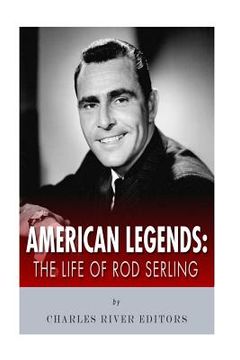Reseña del libro "American Legends: The Life of Rod Serling (en Inglés)"
*Includes pictures *Includes Serling's own quotes about his life and career *Includes footnotes, a bibliography, and online resources for further reading *Includes a table of contents "There's nothing in the dark that isn't there when the lights are on." - Rod Serling A lot of ink has been spilled covering the lives of history's most influential figures, but how much of the forest is lost for the trees? In Charles River Editors' American Legends series, readers can get caught up to speed on the lives of America's most important men and women in the time it takes to finish a commute, while learning interesting facts long forgotten or never known. The "Golden Age" of television was in part so named because it was the era in which new technology was pioneered and industry rules were still being written. Here was a fascinating new medium, founded by executives with no previous body of experience, and a myriad of directions in which to proceed. Numerous factions spent the next generation wresting control over content and the content/product relationship. Some envisioned a public service and educational medium, while others sought sophisticated entertainment. With profit as the determining motive, executives and sponsors sought only what would evoke the most lucrative response. The term "Golden Age" also applies to the reality that much of the television programming in the 1950s was offered up as live performance, a dangerous and exciting time for both writers and actors. As pioneer director John Frankenheimer put it, "There were no old days. We were the old days." Frankenheimer went on to associate with one of the age's best and most prolific TV writers, Rod Serling, an enduring name in the realm of philosophical fright and ironic reflections of human injustice. In another sense, it was the writing of television scripts that defined the era, on as important level as the acting. Many of the best writers strove for a greater degree of enlightenment and public service, and in the process became the early stars of the new paradigm in communications. Many came from the world of radio where sophisticated content in adult programming reigned as a prerequisite for success. Among this group of gifted literary giants was Serling, a prolific writer and social thinker who came to be best known for his iconic Twilight Zone and Night Gallery. Through his personal literary standards, Serling sought to "challenge the medium of television to reach for loftier artistic goals," and for more than two decades, largely succeeded in the face of sponsor resistance and executive tinkering with content and format. In this "Golden Age" of new media writing, Serling and his contemporaries created a television format for which viewers tuned in to hear and see the work of great writers, with the focus on iconic stars to come later. Serling, who went on to be one of modern television's most recognizable writers, producers, spokesmen, and narrators/actors, hailed the potential of the early years as a time where "one could take chances." In the first decade of television's success as a public market, he envisioned a clear path toward a format in which one could write "stirring and relevant teleplays," remaining confident in the belief that individualistic and imaginative offerings would endure in the face of hands-on corporate sponsors and a strict sense of censorship prevalent in the early years. In that era, he was fond of uttering the phrase that supported his individualism, and that of others - "Being like everybody is like being nobody." In later years, he used the phrase in resignation and frustration, as his industry demanded increasingly formulaic and non-controversial offerings. American Legends: The Life of Rod Serling examines the life and career of America's most famous television icons. Along with pictures of important people, places, and events, you will learn about Rod Serling like never before, in no time at all.

